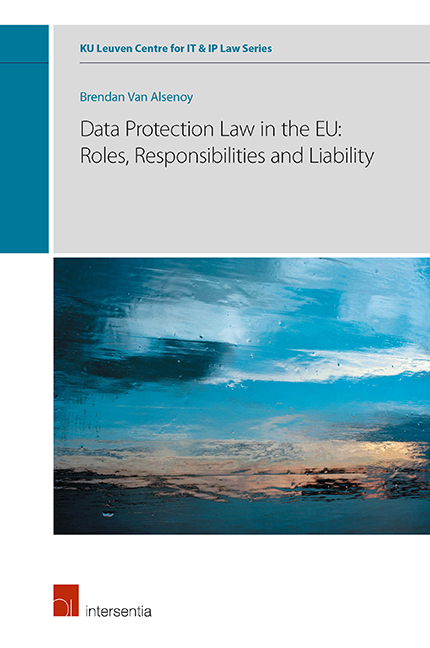Book contents
- Frontmatter
- Foreword
- Note to the Readers
- Acknowledgments
- Abstract
- Contents
- PART I INTRODUCTION
- PART II STATE OF THE ART
- Chapter 1 Introduction
- Chapter 2 Scope of EU Data Protection Law
- Chapter 3 Basic Protections
- Chapter 4 Allocation of Responsibility
- Chapter 5 Liability Exposure of Controllers and Processors
- Chapter 6 Specific Issues
- Chapter 7 Additional Functions of the Controller and Processor Concepts
- Chapter 8 Conclusion
- PART III HISTORICAL-COMPARATIVE ANALYSIS
- PART IV USE CASES
- PART V RECOMMENDATIONS
- Bibliography
- Miscellaneous Endmatter
Chapter 6 - Specific Issues
from PART II - STATE OF THE ART
Published online by Cambridge University Press: 26 June 2019
- Frontmatter
- Foreword
- Note to the Readers
- Acknowledgments
- Abstract
- Contents
- PART I INTRODUCTION
- PART II STATE OF THE ART
- Chapter 1 Introduction
- Chapter 2 Scope of EU Data Protection Law
- Chapter 3 Basic Protections
- Chapter 4 Allocation of Responsibility
- Chapter 5 Liability Exposure of Controllers and Processors
- Chapter 6 Specific Issues
- Chapter 7 Additional Functions of the Controller and Processor Concepts
- Chapter 8 Conclusion
- PART III HISTORICAL-COMPARATIVE ANALYSIS
- PART IV USE CASES
- PART V RECOMMENDATIONS
- Bibliography
- Miscellaneous Endmatter
Summary
217. PROBLEM STATEMENT – Article 4(7) GDPR defines a controller as being a “natural person, legal person, public authority, agency or other body”. The definition thus refers to a broad range of subjects, ranging from natural to legal persons and including any “other body”. In practice, the question may arise whether an individual within an organisation should be considered as the “controller”, or whether instead this role should be attributed to the organisation of which he or she is a part. According to the Article 29 Working Party,
“preference should be given to consider as controller the company or body as such rather than a specific person within the company or the body. It is the company or the body which shall be considered ultimately responsible for data processing and the obligations stemming from data protection legislation, unless there are clear elements indicating that a natural person shall be responsible. In general, it should be assumed that a company or public body is responsible as such for the processing activities taking place within its realm of activities and risks.”
218. RELATIONSHIP WITH OTHER AREAS OF LAW – In Opinion 1/2010, the Working Party emphasizes that it is important to stick as closely as possible to the rules established by other areas of law, such as civil, administrative and criminal law. These rules indicate to what extent individuals, organisations or other bodies may be held responsible and will in principle help to determine which actor should be labelled as the “controller”. The following paragraphs will briefly look at the civil and criminal liability of organisations – and the individuals working on their behalf – from the perspective of Belgian law.
219. LIABILITY FOR AUXILIARIES AND AGENTS – Article 1384, subsection 3 of the Belgian Civil Code (C.C.) provides that masters and principals are liable for damage caused by their servants and appointees (“auxiliaries”). For Article 1384, subs. 3 to apply, the following three conditions must be met:
a) there must be a relationship of subordination between the principal and the auxiliary;
b) the auxiliary must have committed a fault (i.e. negligence or unlawful act); and
c) the fault must have been committed in the course of the service for which the auxiliary has been enlisted.
Article 1384, subs. 3 C.C. is generally applied to hold employers (and legal persons more generally) vicariously liable for actions of their employees and other subordinates.
- Type
- Chapter
- Information
- Publisher: IntersentiaPrint publication year: 2019

